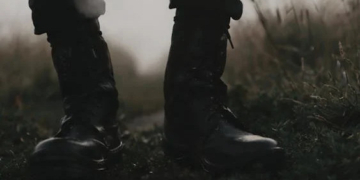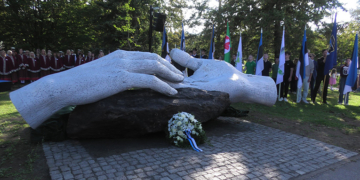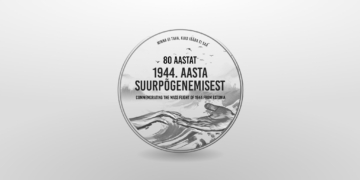Karl Altau, JBANC
Two years ago, Belarusians were everywhere. They have not disappeared.
In summer 2020, there was a nationwide mass movement in support of democracy in Belarus against dictatorship. Elections took place August 9, but results were overwhelmingly deemed fraudulent, unfree, and unfair by the opposition, election observers, and Western governments, which refused to accept the official outcome. Lukashenka clai-med victory, but the Belarusian people knew better. Sham elections in Belarus were common practice since 1996, but 2020 was different. Subsequent protests by tens of thousands of Belarusians, who disagreed with the official results, grew in both size and frequency. A violent crackdown against unarmed and peaceful protesters throughout that country followed. Another tragic mark in the long record of systematic abuses by the regime of Alyaksandr Lukashenka, who assumed power 28 years ago.
Emerging to power the opposition, Sviatlana Tsikhanouskaya claimed her right and responsibility to lead the people of Belarus. Appeals to the authorities to invalidate the results were ignored. Ruthless suppression of the opposition, well-documented by social media, continues to this day.
Tsikhanouskaya became President of the Coordination Council for the Transfer of Power (CCTP), or simply, the Coordination Council of Belarus on August 14, 2020, and with other members and supporters not imprisoned, fled to Lithuania and elsewhere to continue the struggle.
Lukashenka could not be considered the legitimate President of the Republic of Belarus. Tsikhanouskaya and the CCTP called for: Lukashenka to resign; political prisoners to be released; and an end to the violent crackdown on protestors.
Lukashenka’s forces increased the severity of their repression. Talks with Putin in Moscow left open the possibility of Russian military interference.
While the Lukashenka regime continued arrests, incarcerations, and internments, Tsikhanouskaya, and members of the CCTP began to lobby Western governments actively and effectively. That included a high-profile visit to the U.S. in July 2021, and meetings with President Biden, Secretary of State Blinken, and influential Members of Congress. The Baltic community in Washington, DC joined hundreds of Belarusians and friends to greet Tsikhanouskaya when she arrived on July 18.
Sympathy and support for the Belarusian cause grew, and the enactment of wide sanctions on Lukashenka and regime officials were coordinated by the U.S. government and the European Union. Congressman Chris Smith (R-NJ), a longtime champion for Belarusian democracy, introduced the Belarus Democracy, Human Rights, and Sovereignty Act of 2020, which detailed U.S. policy toward Belarus. The bill became law on December 27 of that year.
Congress has established Belarus support groups in both the Senate and House. Senators Roger Wicker (R-MS) and Jeanne Shaheen (D-NH) formed the Free Belarus Caucus last year, to advocate for democracy and free and fair elections. In the House, co-chairs of the Friends of Belarus Caucus are Representatives Marcy Kaptur (D-OH), Joe Wilson (R-SC), Bill Keating (D-MA) and Chris Smith (R-NJ).
Citizens continue to be arrested for flimsy reasons (wearing red, for instance, evoking the outlawed colors of the white-red-white Belarusian flag). Lukashenka’s forces hijacked Ryanair flight 4978 on May 21, 2021, arresting passengers whom the regime had targeted.
As of August 2022, over 1200 persons in Belarus are considered political prisoners, according to the Belarusian Human Rights NGO Viasna.
Secretary of State Blinken stated in January this year that “These Belarusians, from all walks of life, have been arrested and confined simply because they peacefully exercised their rights to freedom of expression and assembly in response to a fraudulent election and the Lukashenka regime’s abuses. Tens of thousands more innocent Belarusians have also spent time in jail since and in the lead up to the fraudulent presidential election in August 2020.”
Belarusians see and know what is happening in neighboring Poland, Lithuania, Latvia, Estonia, and Ukraine. The freedom, democracy, and stability of the Baltics and Poland is palpable, along with the fierce resistance of Ukrainians against the crumbling Russian hegemon.
Lukashenka has made Belarus highly dependent on Russia. He has finally bargained away the country’s sovereignty. If that isn’t treason, what is?
Belarus remains under the fist of Lukashenka, but he is a puppet of Putin’s. He has given away the freedoms that Belarusians aspire to and has allowed Russian troops to occupy Belarus and dictate its terms. Observers saw it coming with the Zapad military exercises last September, which pre-positioned Russian troops and equipment into Belarus.
We continue to hear tales of heroism. This includes seeing the derailment of military supply trains by Belarusians against the war in Ukraine. Belarusians have volunteered to fight for Ukraine’s freedom. The “Kalinouski” regiment was formed and by July’s end, more than ten Belarusian volunteers had died defending Ukraine. They are a reminder to us all, that free-minded Belarusians abhor Moscow’s rule.
Russia continues to fire missiles into Ukraine from the territory of Belarus. Franak Viačorka, Senior Advisor to Tsihanouskaya, tweeted on July 28: “This morning, Russians launched more than 25 missiles from the territory of Belarus. Kyiv, Chernihiv, and several other cities were shelled. Lukashenka’s bloody regime is a complete accomplice in a war against Ukraine. They are war criminals holding our country…hostage.”
The words of Sviatlana Tsikhanouskaya, in an August 2 tweet: “We cannot be blackmailed by a dictator. There can be no deals until Lukashenka fulfills all the fundamental conditions supported by Belarusians [and] our partners. The conditions are clear: putting an end to repressions, release of political prisoners [and] withdrawal of Russian troops.”
The least we can do is to not forget Belarus. Belarusians understand the “Baltic Way” and it is our responsibility to support their aspirations for a normal life in a normal country.
When Putin departs the scene, there may be an opportunity to reverse Russia’s course and stranglehold of Belarus. Much depends on where Russia will find itself then – digging itself a deeper hole as a pariah state – or waking up and reimagining itself as a responsible actor and good neighbor. It might not happen soon. Balts, Poles, and Ukrainians can continue shining the light and leading the way, and demonstrating by words and actions, that there is a way out of the darkness for Belarus.
To learn more or to help ensure strong U.S. support for the Baltic countries, and to stand with Belarus and Ukraine, please contact the Joint Baltic American National Committee (JBANC): jbanc@jbanc.org.
























